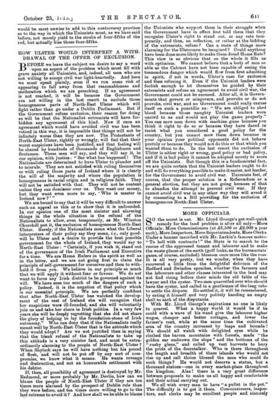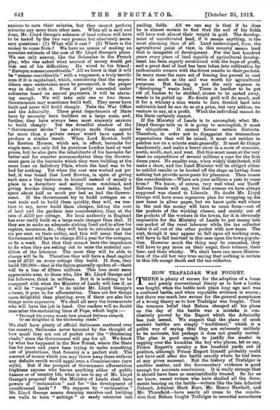MORE OFFICIALS.
SO the secret is out. Mr. Lloyd George's get-well-quick remedy for the land problem is after all only—More Officials: More Commissioners (at £1,500 or ..t2,000 a year each), More Inspectors, More Superintendents, More Clerks. Under a banner inscribed with Mr. Larkin's famous motto: " To hell with contracts !" the State is to march to the rescue of the oppressed tenant and labourer and to make the waste places of the earth (golf links, as the bureaucrats' game. of course, excluded) blossom once more like the ruse It is all very pretty, but we wonder, when they have recovered a little from the delightful delirium of the Bedford and Swindon speeches, whether the farmers and the labourers and other classes interested in the land may not find rising before their minds the old fable of the lawyer and the oyster. Two men quarrelled over who should have the oyster, and called in a gentleman of the long robe to settle the dispute. He settled it, it will be remembered, by eating it himself and very politely handing an empty shell to each of the disputants.
With Mr. Lloyd George's aspirations no one is likely to quarrel. What a happy world it would be if he could with a wave of his wand give the labourer higher wages, cheaper and better cottages, and lower the farmer's rent, while at the same time the cultivated area of the country increased by leaps and bounds ! We should all watch with delighted eyes while he clothed the barren mountains with forests, made " the golden ear embrown the slope " and the bottoms of the " rushy glens," and called up vast harvests to bury the pride of the deerstalker. Who is there throughout the length and breadth of these islands who would not rise up and call thrice blessed the man who oould do such things ? He would not deserve a statue, but a thousand statues—one in every market-place throughout the kingdom. Alas ! there is a very great difference between proposals to make us all happy and comfortable and their actual carrying out.
We all wish every man to have " a pullet in the pot." The difficulty is to get it there. Commissioners, inspec- tors, and clerks may be excellent people and sincerely
anxious to earn their salaries, but they cannot perform miracles any more than other men. When all is said and done, Mr. Lloyd George's schemes of land reform will have to be tested by the two very prosaic but absolutely neces- sary questions: (1) What will it cost ? (2) Where is the money to come from ? We have no means of making an accurate estimate of the cost of Mr. Lloyd George's plaus. We can only answer, like the Bohemian in the French play, who was asked what amount of money would get him out of his difficulties. He wired to his friend : " Envoyez sommeconsidera,ble." All we know is that it will be " somme considerable " with a vengeance, a truly terrific sum if it is capitalized, which, considering that the expen- diture once undertaken must be permanent, is the proper way to deal with it. Even if partly concealed under estimates based on annual payments, it will be alarm- ing enough. We will take only one or two items. Governments may sometimes build well. They never have built and never will build cheaply. Take the War Office and the Admiralty. These great departments of State have by necessity been builders on a large scale, and, further, they have always been most sincerely anxious to build cheaply. Yet the dreadful shadow of the " Government stroke " has always made them spend far more than a private owner would have spent to produce a similar result. When Lord Rowton built his Rowton Houses, which are, in effect, barracks for single men, not only did he purchase London land at vast prices, but he also gave the inhabitants of his barracks far better and far smarter accommodation than the Govern- ment gave in the barracks which they were building at the same time on Salisbury Plain, where the land was to be had for nothing. Yet when the cost was worked out per bed, it was found that Lord Rowton, in spite of giving each man a tiny bedroom to himself instead of merely a place in a dormitory and eating room combined, and giving besides dining rooms, libraries, and baths, had spent about half as much per bed as had the Govern- ment. If the Government try to build cottages on a vast scale and to build them quickly, they will, we ven- ture to say, never build them cheaper, taking the cost of land and the gardens into consideration, than at the rate of .t250 per cottage. No local authority in England has ever really built on a large scale cheaper than that. If they are to make an adequate sinking fund and to allow for repairs, insurance, &c., they will have to calculate at least six per cent. on their outlay, and this will mean that the Government will have to charge ,15 a year for the cottages, or 6s. a week. But that they cannot have the impudence to do when they are setting out to raise the material con- dition of the labourer. The most they will be able to charge will be 3s. Therefore they will have a dead capital loss of £125 on every cottage they build. If, then, they build 120,000—that is the figure generally spoken of—there will be a loss of fifteen millions. This loss must seem appreciable even to those who, like Mr. Lloyd George and his followers, think in millions. But it is nothing to be compared with what the Ministry of Lands will lose if, as it will be " required " to do under Mr. Lloyd George's scheme, it goes in for afforestation. There are few things more delightful than planting, even if there are also few things more expensive. We shall all envy the bureaucrats who will have the job in hand. Our readers will no doubt remember the enchanting lines of Pope, which begin :—
"Through his young woods how pleased Sabinus strayed,
Or sat delighted in the thickening shade."
We shall have plenty of official Sabinuses scattered over the country, Sabinuses never haunted by the thought of how much they are out of pocket over the " thickening shade," since the Government will pay for all. We know by what has happened in the New Forest, where the State has for years and years been trying to make something cut of plantations, that forestry is a perfect sink. The amount of money which you may throw away there without any definite result would appal even a Commissioner (new style). But if the prospect of Government afforestation frightens anyone who knows anything either of public finance or of country life, what is one to say of Mr. Lloyd George's proposal that the Ministry of Lands shall have powers of " reclamation " and for " the development of uncultivated lands " ? We suppose by " reclamation " Mr. Lloyd George means draining marshes and building sea. walls to turn " saltings " or sandy estuaries into
smiling fields. All we can say is that if he does he is almost certain to find that the soil of his fields will have cost almost their weight in gold. The develop- ment of uncultivated land, if it means anything, is the most alarming item of all. Land undeveloped, from the agricultural point of view, in this country means land that is incapable of development. For the last hundred years every piece of land capable of agricultural develop- ment has been eagerly scrutinized with the hope of profit, and a great deal of laud has been taken into cultivation by enthusiastic owners with the direst results to their pockets. In many cases the mere act of fencing has proved to cost twice as much as the soil was worth for agricultural purposes. But fencing is not the only expense in " developing " waste land. There is heather to be got rid of, bushes to be stubbed, stones to be carted away, weeds to be pulled up. No doubt gold will do much, and if for a whimsy a man wants to turn derelict land into cultivable land he can do so at a price, but very seldom, we venture to say, at a profit. What the individual cannot do the State certainly cannot.
If the Ministry of Lands is to accomplish what Mr. Lloyd George tells us it is going to accomplish, it must be ubiquitous. It cannot favour certain districts. Therefore, in order not to disappoint the tremendous expectations that will be raised, it must act neither in patches nor on a minute scale generally. It must do things handsomely, and make a brave show in a score of counties, north, south, east, and west. But this must mean at the very least an expenditure of several millions a year for the first dozen years. No smaller sum, when widely distributed, will make a show, and the Land Minister will be obliged either to exhibit results or be hooted off the stage as having done nothing but provide more posts for placemen. Then comes the consideration—Where are your millions a year to come from ? We know, of course, very well what our Tariff Reform friends will say, but that avenue we have always supposed was closed to Liberals. No doubt Mr. Lloyd George will have some ingenious plan for wrapping up his new taxes in silver paper, but we know quite well where in the end the money will have to come from—out of the pockets of the working classes, and mainly out of the pockets of the workers in the towns, for it is obviously impossible for the Ministry of Lands to put money into one pocket of the rural labourer while the tax collector takes it all out of the other pocket with new taxes. The cost, though it may appear to fall upon all working men, will have to fall heaviest in this case upon the town popula- tion. However much the thing may be concealed, they will have to pay more on their sugar, their tobacco, their beer, and their whisky. We shall have one more illustra- tion of the old but very true saying that nothing is certain in this life except death and the tax-collector.















































 Previous page
Previous page